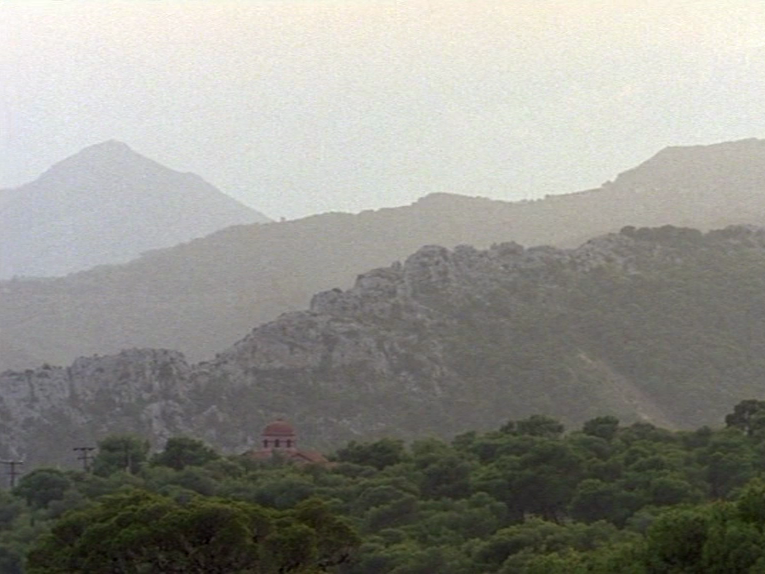
In 1989, Jean-Daniel Pollet was paralyzed after a train accident. From his home in Provence, he revisits the images, already tinged with the melancholy of memory, of his last trip to Greece, at the time of the Gulf War.
“Ziehier een cineast die zich de mythes meester heeft gemaakt en ze heeft doen schitteren. (...) Het is de stille kracht van een eenzame filmmaker, verliefd op Griekenland (waar hij een aanzienlijk deel van zijn films draaide), onrechtvaardig vastgeklonken aan zijn rolstoel na een ‘arbeidsongeval’, op zoek naar een elders dat hij zo goed heeft beschreven. (...) Uiteindelijk leven de beelden hun leven. Ze reizen, gaan van de ene film naar de andere, gedragen door de houdingen en bewegingen van de camera, bevinden zich soms ‘aan de andere kant’ of ‘aan de overkant’, overschrijden altijd (zoals treinen) de intenties van de cineast.”
Boris Lehman1
« Suite à une invitation à un colloque, je suis parti d’ici (Cadenet, Vaucluse), c’est là qu’a commencé mon film, avec ma voiture et ma caméra. La caméra, c’est partir avec quelque chose qui te protège. Je serais plutôt à me rassurer dans une maison comme le poète... qui écoute quand même beaucoup de choses, mais partir est toujours une entreprise fantastique... Le film est bloqué à cause d’images de CNN et FR3 sur la guerre du Golfe mais aussi à cause d’une publicité Peugeot que j’avais intégrée comme images d’actualités. Je ne voulais pas que ce film soit juste une sortie de France pour aller en Grèce faire simplement “trois jours en Grèce”, il me fallait aussi parler du monde, et pour cela, rien ne valait les images de la télévision. Seulement, malheureusement, aujourd’hui tout s’achète et j’ai les pires ennuis depuis plus d’un an avec les droits de diffusion de ces images. »
Jean-Daniel Pollet2
“Jean-Daniel Pollet used to say that Greece was his ‘second home’. He encountered it in 1962, at the age of twenty-six, during the journey that preceded the making of Méditerranée (1963). On his return, he spent several months locked up in a cellar looking for the montage, which he found one Easter day. Never before had we seen such a thing: a series of images that return and are arranged in a fugue whose loops replay the circularity of the journey around the Middle Sea. Over the years, Pollet never stopped going back to Greece, filming some of his major films there. In 1991, Three days in Greece closed the series. The filming, three decades after the first trip, would be his last stay in the motherland. The last Greek film, it is also, in accordance with the deep law of Pollet’s cinema, a return to the origin, remake, reworking and relaunching of Méditerranée. Reinvention of its broken circularity, of its syncopated pace, the same vertigo danced above the abyss, but untied, unfolded, lightened or lifted by the grace of a new serenity... Pollet’s cinema, transported by the spirit of dance, reaches in Trois jours en Grèce the amplitude of a cosmogony.”
Cyril Neyrat3
“In a classic film, Belmondo gets out of a car, enters a restaurant, goes to the phone. We follow him. It’s not editing, even if there are connections, several shots: we just follow him, from one shot to the next. The ellipsis – you cut a little bit of time and the viewer is supposed to understand what you cut – it’s still not really editing, you have to cut even more – you don't know why you go from one shot to another. Then you get a certain logic, poetry... For me, this language comes naturally: there, long live the editing and the mechanism of dreams soaked in the unconscious!... long live the editing at night just before going to sleep. An enlightening montage, as with dreams, where there is no other logic than that of the unconscious. A logic which is that of happiness or that of suffering.”
Jean-Daniel Pollet4
« Que savons-nous de la Grèce aujourd'hui...
Que savons-nous des pieds agiles d'Atalante...
Des discours de Péricles...
À quoi pensait Timon d'Athènes en grimpant au forum...
Et cet écolier de Sparte pendant que le renard
mangeait son ventre.
Elargissons le débat...
Que savons-nous de nous-mémes,
hormis que nous sommes nés là
Il y a des milliers d'années...
Que savons-nous donc de cette minute superbe
où quelques hommes,
comment dire,
au lieu de ramener le monde à eux
comme un quelconque Darius ou Gengis Khan,
se sont sentis solidaires de lui,
solidaires de la lumière non pas envoyée par les dieux
mais réfléchie par eux,
solidaires du soleil, solidaires de la mer... »
Jean-Luc Godard 5
- 1Boris Lehman, “Jean-Daniel Pollet (overhaaste indrukken),” Sabzian, 11 september 2019. Origineel: Boris Lehman, « Jean-Daniel Pollet (impressions hâtives) », Zeuxis 16, 2004; Sabzian, 11 septembre 2019.
- 2Jean-Daniel Pollet [1993] cited in Pollet retrouvé: Retrospective des films de Jean-Daniel Pollet (Montreuil: La Traverse, 2020), 42.
- 3Cyril Neyrat, “En Grèce, miraculé, sur un tapis volant,” Trois jours en Grèce DVD Booklet La Traverse, 2020, 31. Translation from French into English by Courtisane Festival.
- 4Jean-Daniel Pollet & Gérard Leblanc, L'Entre Vues (Paris: Les Editions de l'Oeil, 1998). Translation from French into English by Courtisane Festival.
- 5Jean-Luc Godard, “Impressions anciennes,” Cahiers du cinéma, 187 (1967), 38-39.

